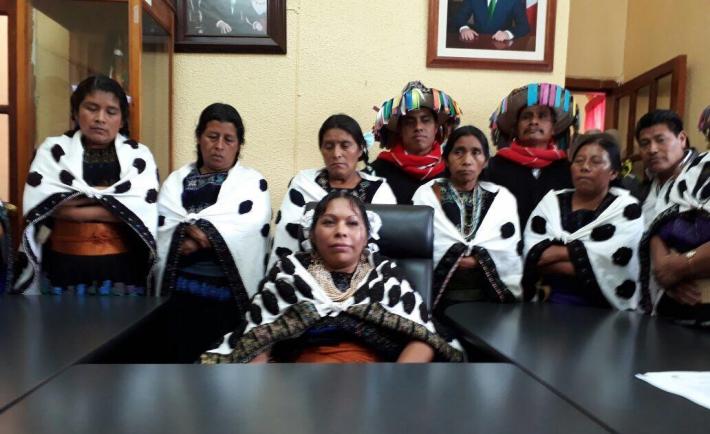
Sandra Pepera, Senior Associate and Director for NDI's Gender, Women and Democracy team.

Picture tweeted by Rosa Pérez when she returned to her Municipality Office after the Federal Electoral Court ruled in her favor.
Latin America is the leading region in the world addressing violence against women in politics (VAWP). As a former justice of the Federal Electoral Court in Mexico and as the first woman to be president of that Court, I wish to share my thoughts on the current legal status of the issues in Latin America. I will also provide recommendations on how the campaign can stop this type of violence.

Brazilians take to the streets to protest rampant government corruption on March 13, 2016. Photo by Agencia Brazil (CC BY 3.0 BR)
What do Mexico’s Andrés Manuel López Obrador, Hungary’s Viktor Orbán, the Philippines’ Rodrigo Duterte and Venezuela’s Hugo Chávez have in common? They’ve all been branded as populists, both celebratorily and scathingly. As Brazil heads to elections on October 7, all eyes are on ultra-conservative candidate Jair Bolsonaro – who brazenly rejects political correctness, defends Brazil’s authoritarian past and promises to upend the establishment – as the latest in a line of political strongmen turning citizen malaise into electoral success. Charismatic populist leaders present society as divided into two separate and homogeneous entities: the corrupt elite, and the pure people who the corrupt have oppressed. Proclaiming their direct link to the people (often enabled by social networks), they tend to eschew representative institutions and checks and balances. While left-wing populists take a class-based approach pitting working and middle-class people against a greedy economic elite, right-wing populists typically define the people as an exclusive group along ethnic, racial or national lines.
There is a widespread belief among young people in Burkina Faso that the current political class lacks a credible vision that takes into account the aspirations of the nation’s youth. The only way to solve this is for young people to stand for election, and to propose new and alternative ideas for the development of our country. This is particularly true when it comes to the nation’s long-term economic well-being – which will affect the lives and futures of the nation’s young citizens the most. But youth are also concerned about other pressing issues, such as the independence of the judicial system and a lack of security from extremist groups (especially in the northern regions). There is no single, defining “youth issue,” nor is there a single youth perspective on the challenges our country faces. Young people must have seats at the table so that we can play an active role in building our own future.
Many eye-catching headlines, World Bank indicators and even news on social media highlight and congratulate feminist progress based on the growing number of women elected to parliament, cabinet or other political bodies. For example, when my home country of Nepal elected its first female president, it was touted as a great step forward for women’s equality. However, these examples mask important underlying issues that limit progress for women. A single number really doesn’t tell the full story. In fact, for every side there is to a story, there should be a dataset to tell it.
On September 4, I became NDI's third president. I do so with humility, at a time when democracy around the world faces its most serious challenge in memory. While the United Nations' theme for this year's International Day of Democracy is "democracy under strain," let us honor the day not just by reflecting on challenges but also how far we’ve come.
It’s amazing what humanity can do with the right tools. If you’ve ever looked up the work of Marshall McLuhan, he talks about how even the basic things we create change our outlook on life, politics and society. He’s also often attributed to having said, "We shape our tools and, thereafter our tools shape us…". The light bulb, for example, changed what time of day we can commune with each other.
I have been developing and designing software for close to twenty years. Since joining NDI, I’ve been thinking about the tools we build and how those tools, in turn, shape the lives of beneficiaries around the world. Human-centered design is the process of designing technology with and around the humans who use it. This process is analogous to building a bridge to connect two worlds. Just like civil engineers, practitioners of human-centered design at NDI must connect technology to the needs of citizens.
For more than three decades, NDI has supported political party youth wings as a means of engaging young people in formal politics. Youth wings are semi-independent bodies within a political party. Although structures differ, most youth wings have an established age for membership (e.g., 16-35), work to initiate young people into party politics and strengthen a party’s ability to address youth-specific policy issues – among other core functions. Organized youth wings, across party systems, are indicative of an important minority of young people trying to satisfy political aspirations through political party involvement. Youth wings can be a source of creativity and dynamism within a political party and are enabled when they have opportunities to shape party policies and participate in decision making.
In honor of International Youth Day 2018 let’s discuss the importance of safe spaces for youth political agency and participation. Safe spaces can mean formal or informal spaces in which young people feel emotionally and physically safe, and can exist without discrimination for who they are or what they believe. While these spaces are formed for a variety of reasons, creating safe civic and political spaces can help young people securely participate in political processes, interact with political institutions and engage more meaningfully with decision-makers.
Elections are one of the most critical elements of any democratic system, but also one of the moments where democracy is most vulnerable. Politicians compete to take control of the executive, become representatives in legislatures and sometimes appoint judges across branches of government, and the information environment plays a crucial role in the debates that decide who will represent the will of the people. This environment is increasingly mediated by the internet, through social media platforms, messaging apps, email and a wealth of new tools and applications that come online every day. Unfortunately, this new online environment is also increasingly polluted by disinformation.

Credit: Dave Taylor
In technology, you often hear geeks referencing the classic “garbage in, garbage out” problem. When the inputs to a system are bad, however beautifully crafted the program itself may be, the outputs will necessarily be bad as well. Our democratic systems are dependent on the input of citizens, but when disinformation is also an input the outputs of our processes can be deeply flawed. Disinformation and the systemic distrust it fuels has been a dangerous ingredient in the global surge of nativism, intolerance, and polarization undermining democracy and human rights around the world. Understanding and stopping disinformation is a tremendous challenge; any single solution will be incomplete so many will be required. In 2018, the fastest, most virulent and dangerous disinformation is spreading on digital platforms, and as such technical understanding is critical to wrap our heads around the problem.